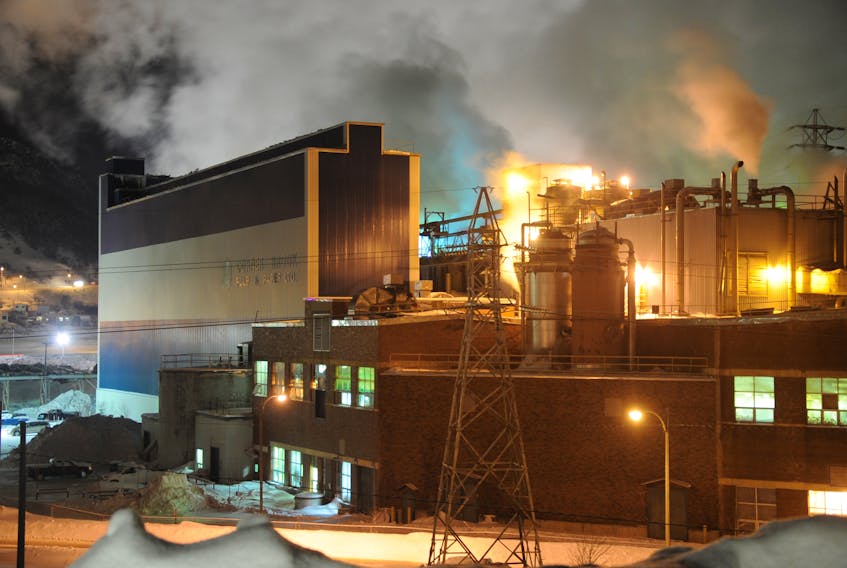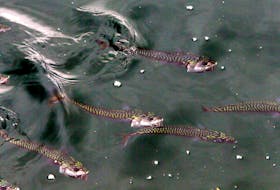When word came of the potential for two new U.S. tariffs against Canadian newsprint this year, Paul Humber thought the first of the two would likely be the toughest for Corner Brook Pulp and Paper. He was wrong.
The president of Unifor Local 242, representing papermakers, has learned the countervailing duty of 9.93 per cent slapped on Corner Brook Pulp and Paper’s uncoated groundwood paper products — including newsprint — in January will be dwarfed by a new, 22.16 per cent anti-dumping duty on the same products.
The preliminary trade decisions from U.S. Department of Commerce will combine for an estimated $30-million annual cost to the mill, and parent company Kruger Inc.
The mill will, within a week, pay the highest duties of any mill in Canada when shipping to the U.S.
“Kruger, as far as we know, didn’t do any dumping,” Humber told The Western Star in an interview Wednesday, disappointed with how the Canada-U.S. trade wars are affecting Corner Brook.
Last week, a dozen positions — though not people — were cut at the paper mill. Humber doesn’t think the first round of new U.S. duties were the main reason, because there had already been talk of cuts.
“A lot of people like to connect the dots and say one is attributable to the other, but I don’t know if that’s true or not,” he said.
No one has been sent packing, and he doesn’t see the latest announcement automatically turning to layoffs. He doesn’t know how layoffs would work.
“I can’t see how they can make that amount of money back just from trimming a few jobs,” he said, adding the mill is already running “lean.”
He said a diplomatic approach is needed.
Kruger Inc. echoed the union leader’s sentiments in a statement Wednesday.
“The company urges the Canadian government to make all necessary representations with Commerce and the U.S. International Trade Commission to reverse this decision,” it read.
The company committed to pursuing legal options, working to minimize the impact of the U.S. duties and ensuring the viability of its operations.
Added costs are set to directly affect Kruger mills in Trois-Riveres and Brompton in Quebec, in addition to Corner Brook.
No officials from Kruger or Corner Brook Pulp and Paper would do an interview Wednesday.
“There’s no short-term fix to this,” Premier Dwight Ball said Wednesday afternoon at a news conference at Confederation Building in St. John’s.
Ball said he was informed of the new anti-dumping tariff Tuesday and had been in contact since with the head of Kruger Inc., community leaders in Corner Brook, union leaders and federal government representatives.
“I spoke with Mr. Kruger (chairman and CEO of Kruger Inc.) this morning and I can tell you he’s not giving up on Corner Brook. That’s for sure. Neither are we, as a government,” Ball said.
He said the company has not asked for money from the government in direct relief. Ball has not ruled out any actions in response.
Progressive Conservative Leader Paul Davis questioned why the federal Liberals are not saying more about the tariffs, directly threatening Newfoundland and Labrador’s forestry industry.
The Corner Brook mill is the last of the province’s paper mills. The Liberals have referred to it as the backbone of the local industry.
“If I was premier today, I would be having very quick and fast discussions with our federal counterparts, with the prime minister, who recently — when it was steel and aluminum on the line — stood proudly in front of the cameras and said we will work to fix this immediately,” Davis said.
“It takes more than just working with the industry and Mr. Kruger. Something has to happen, today, before it has an impact.”
PC MHA Keith Hutchings mentioned something the premier noted, that the mill in Corner Brook is not only hurt by the new duties in the U.S. market against U.S. competitors, but also against its Canadian competitors, who now face lower U.S. tariffs and less of a mark-up on their shipments south.
The two trade cases — countervailing and anti-dumping — have each involved direct inquiries by U.S. Commerce to a few, select Canadian companies in the forestry sector. The companies named receive a distinct tariff decision, with others in the sector assigned a tariff based on an average or weighted value.
In the countervailing case, with a determination governments here subsidized Kruger Inc. (Corner Brook Pulp and Paper) and others to the point of providing an unfair competitive advantage against U.S. companies, the Government of Newfoundland and Labrador and local mill operation was in direct contact with U.S. investigators. Kruger and Corner Brook were ultimately hit with the highest tariff in the preliminary decision in that case.
The second and more recent investigation, leading to the anti-dumping duty, did not directly involve Kruger or Corner Brook. As a result, the more than 22 per cent tariff comes without the company being able to file information or objections.
Two of Kruger’s major competitors, Resolute Forest Products and White Birch, were selected for direct inquiries and did not get hit with any new duties. Catalyst Pulp and Paper and all other producers, including Kruger, were hit with the added 22.16 per cent tariff.
“The company is disappointed with a decision that is not only unfair, but also unfounded, considering that an investigation (into Kruger) would demonstrate clearly that Kruger does not engage in dumping activities,” Kruger Inc. said in its prepared statement. “In fact, Kruger has been pulled into the current environment of broader trade disputes and is subject to rulings that are inconsistent with its business practices.”
Money begins to be collected at the border by U.S. Customs and Border Protection within days of the preliminary decisions.
The next step is further review, including an opportunity for responses. U.S. officials have been in Corner Brook within the last two weeks for further investigation on the first trade case, on countervailing duties.
Final decisions are expected later this year.









